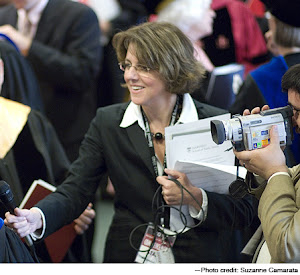It was two days before my 12th birthday, a
Friday, so that was the day I’d be wearing the ribbon corsages from my friends.
It was a birthday tradition in our seventh grade that girlfriends would give
other girlfriends a package bow to wear, decorated with long ribbons festooned
with candy. Its real purpose, however, in the mean and hierarchical society of
female adolescence, was to enumerate how many girlfriends you had - a crude
but accurate measure of popularity.
Alas, I was wearing only two bows that day; my hopes for a
third had not panned out. I was awkward, too "brainy" and already a kind of
observer, on the edge of the scene. But I was glad for the two red bows and for
being 12 and finally in junior high school, and I wore those bows on my cardigan
sweater during the morning.
The announcement came across the loudspeaker in Mr. Miller’s
social studies class. I don’t remember what was said, only looking over at Mr.
Miller, who was straddling a kid’s desk in front, half-turned from us…his long face
was stricken; when he looked up he spoke in a different voice, higher, kind of
strangled, about our president being shot, and his demeanor more than anything
marked that moment for us as something larger than our social studies class. I
removed the ribbons from my sweater and put them in my looseleaf binder. I had
a resentful thought that my birthday was now ruined; then stashed that thought
away in my binder as well.
We were sent home early. In those days everyone’s mother
would be waiting at the house. Only Chris next door came home after school to a
house without a mother. She worked in the city as a secretary. She wore pink
lipstick and peacock-colored suits like Doris Day. Chris’ father had died
during a heart operation when we were about eight years old. My mother always
said it was a shame; they had gone to a local hospital for the operation
instead of into the city. Chris’ father
had taught me how to swing a baseball bat, pitching to us with the garage door
as backstop. He was tall and had tortoiseshell glasses.
As I walked into our house, the door opened to reveal the
long foyer and then, backlit in silhouette against the picture window in the
kitchen I saw, not my mother but my father, and I felt a shudder. This was the
image I’d always connect with the assassination. My father was never home
during the day.
There was a silence in the house, and my parents moved like
through water, slowly, deliberately. I copied their silence; stilled my news
about my birthday ribbons. The radio was on in the kitchen. Later there were
days and days in front of the black and white TV, watching the shaken
commentators and eventually the solemn and elaborate funeral and baby John John’s
salute. If I had a birthday party that weekend, I don’t remember it.
For a generation born after World War II, now we would know that
bad things could happen suddenly, inexplicably, leaving shattered our sense of
ourselves in the larger world. But we’d learned that already on my neighborhood block.
One day some months after the death next door, my father took
Chris with us to a baseball game at Yankee Stadium. We brought our mitts,
hoping to catch a foul ball from Mickey Mantle or Roger Maris. I guess it was
the best my father could do for Chris. My friend absorbed his loss quietly. We
grew up together and finished high school, then went our separate ways to
college, but I can still reach back to a time when his father was there and
then feel that line of demarcation when he was not, and we stood baffled in the
driveway now, not knowing how to talk to each other or what to do. That’s what
I remember.




No comments:
Post a Comment